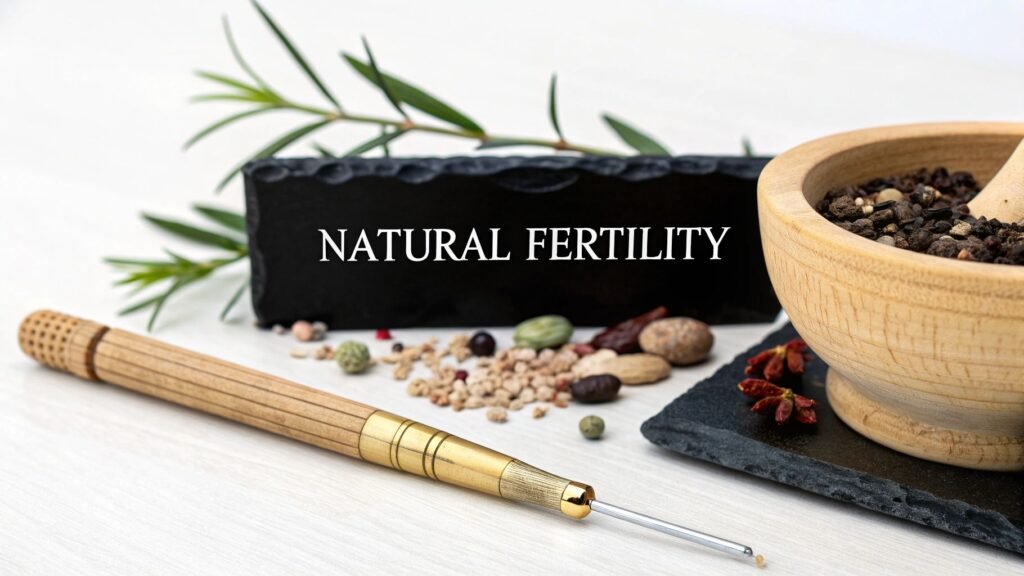When you're trying to conceive, Traditional Chinese Medicine (TCM) can play a powerful role by helping rebalance your body's core systems. It approaches fertility from a holistic perspective, seeing it not as a simple mechanical process but as a direct reflection of your body's overall harmony.
The goal isn't just to target one specific issue; it's to get to the root cause of infertility by creating an optimal internal environment. It’s a lot like gardening—you can’t just stick a seed in dry, depleted dirt and expect it to grow. You have to patiently tend the soil, making sure it’s fertile and ready to nurture new life.
The Foundations of a Fertile Body in TCM
From a TCM standpoint, fertility isn't just about the health of your reproductive organs. It’s about the intricate wellness of your entire body. So, when a couple is having trouble conceiving, a skilled practitioner looks for the deeper, underlying imbalances that might be throwing the body’s natural processes off track. This is a shift away from just chasing symptoms and a move toward restoring a state of deep, systemic health.
The garden analogy really is the best way to think about it. For a seed to sprout, grow strong roots, and ultimately flourish, it needs nutrient-rich soil, the right amount of water, and plenty of sunshine. TCM works in much the same way—we aim to cultivate the perfect internal "garden" for conception and a healthy pregnancy. This means bringing several key elements into harmony.
The Core Concepts of TCM Fertility
At the very heart of traditional chinese medicine fertility are a few foundational ideas. Once you grasp these concepts, it becomes much clearer how things like acupuncture, herbal medicine, and lifestyle adjustments all work together to support your journey. The primary focus is on balancing a few key things:
-
Qi (Vital Energy): This is the fundamental life force that animates your body and powers every physiological function. When it comes to fertility, strong, freely flowing Qi is non-negotiable—it's needed for everything from healthy ovulation to successful implantation. If your Qi is stagnant or deficient, it can manifest as problems like irregular cycles or poor ovarian function.
-
Blood: In TCM, Blood is a rich, dense substance that literally nourishes life. It's what builds a thick, healthy uterine lining and provides the essential nutrients for a growing fetus. When we see what's called a Blood deficiency, it often correlates with a thin uterine lining or scanty periods.
-
Yin and Yang: These are the two complementary, opposing forces that must remain in a delicate balance for your body to function optimally. Yin represents the cool, moist, and nourishing qualities (think follicular growth), while Yang represents the warm, active, and energetic functions (like ovulation and implantation). You need sufficient Yin to mature a healthy egg, and you need a powerful surge of Yang to release it and secure it in the uterus.
This infographic helps visualize how these pillars of health are absolutely central to enhancing your fertility.
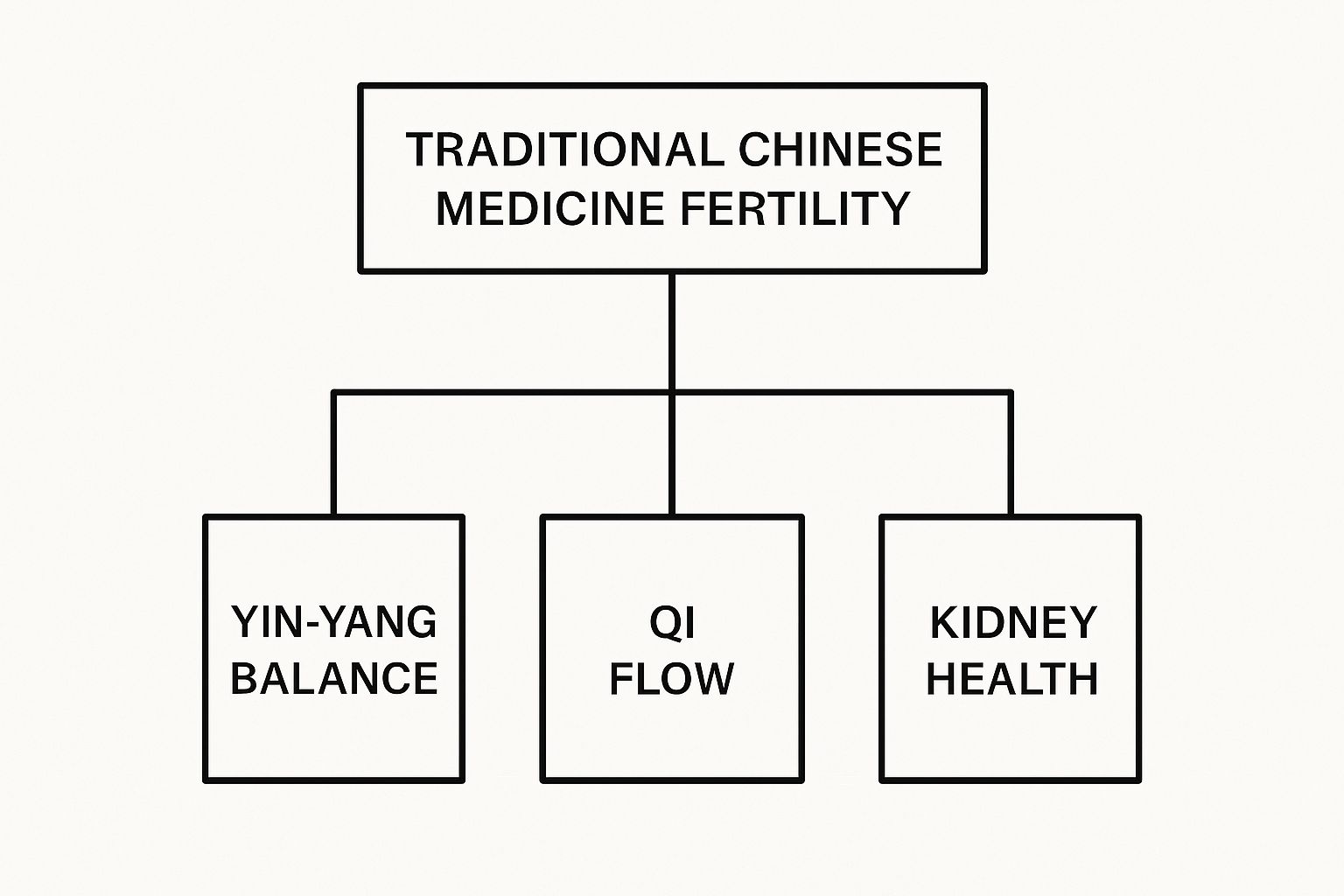
As you can see, a successful fertility journey from a TCM perspective hinges on the beautiful synergy between Yin-Yang balance, the smooth flow of Qi, and robust Kidney health.
To help you connect these ideas, here is a quick summary of how these concepts relate directly to your reproductive health.
Core TCM Concepts for Reproductive Health
This table summarizes the fundamental principles of TCM and their role in creating a fertile environment within the body.
| TCM Concept | Garden Analogy | Role in Fertility |
|---|---|---|
| Qi (Vital Energy) | Sunlight & Energy | Provides the functional "spark" for ovulation, implantation, and hormonal signaling. |
| Blood | Nutrient-Rich Soil | Builds a healthy uterine lining and nourishes the embryo and fetus. |
| Yin | Water & Moisture | Matures follicles, creates fertile cervical mucus, and keeps the body cool. |
| Yang | Warmth | Provides the heat needed for ovulation, implantation, and maintaining a pregnancy. |
These principles are the bedrock of this ancient medicine. Understanding them is the first step in seeing how we can work with your body's innate wisdom to improve fertility.
If you're interested in digging deeper into these foundational ideas, you can learn more about what is traditional chinese medicine and its core philosophies.
How Acupuncture and Moxibustion Support Conception
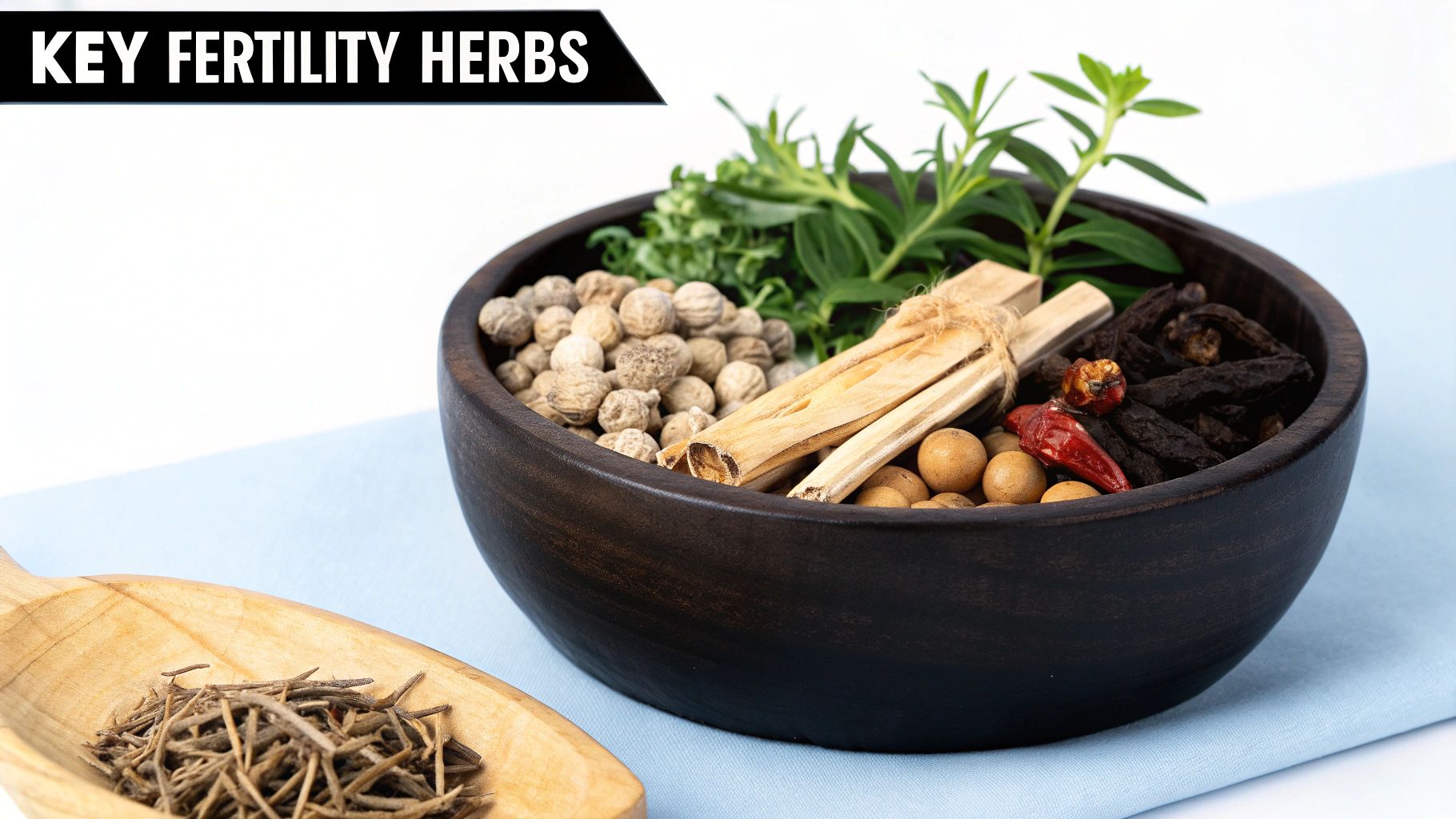
When you dig into traditional Chinese medicine fertility treatments, two therapies consistently come to the forefront: acupuncture and moxibustion. These are the cornerstones of our work. Acupuncture, in particular, is so much more than just placing needles. It’s like having an expert traffic controller for your body’s internal energy systems.
The entire goal is to clear out any energetic “traffic jams” and ensure that your vital energy (Qi) and Blood can flow freely and nourish your reproductive organs. If your body's resources are stuck or diverted elsewhere, your uterus and ovaries simply won't get what they need to thrive. By placing ultra-fine needles at very specific points, we can reopen these pathways and guide that vital flow right where it needs to go. The effect on the reproductive system can be profound.
Regulating and Strengthening Your System
One of the first things we focus on with acupuncture is bringing hormonal balance back to your body and regulating your menstrual cycle. It’s foundational. By stimulating specific points, a skilled practitioner can directly influence the endocrine system, which often leads to more predictable ovulation and a stronger, healthier luteal phase. This stability creates a reliable window for conception to happen.
We also see significant improvements in ovarian function. When you increase blood flow to the ovaries, you’re delivering more oxygen and nutrients to the developing follicles. The result? A better chance at producing higher-quality eggs, which is a critical piece of the puzzle for a successful, viable pregnancy.
By addressing both the physical and energetic aspects of fertility, acupuncture aims to create a body that is not just capable of conceiving, but truly ready and receptive to new life. It harmonizes the body's internal environment to support a healthy pregnancy from the very beginning.
This isn't just an Eastern practice anymore; its influence is growing worldwide. For instance, roughly 10% of U.S. adults have tried acupuncture, many of them for fertility support, and insurance coverage is becoming more common. You can learn more about the global rise of Traditional Chinese Medicine on mordorintelligence.com.
The Role of Moxibustion
Moxibustion, or "moxa," is a wonderfully gentle warming therapy that we often pair with acupuncture. It involves burning a specially prepared herb, Artemisia vulgaris (mugwort), near the skin. This isn't about burning you; it's about introducing a deep, penetrating warmth into specific acupuncture points.
This therapy is key to creating what we call a "warm womb," a central concept in TCM fertility. Think of it as making the uterus a cozy, welcoming home for an embryo to implant. A warm, well-circulated uterus is far more receptive.
Moxibustion specifically helps to:
- Increase blood flow to the uterus and pelvic region.
- Dispel "cold" from the body, a factor that can obstruct conception.
- Strengthen Yang energy, which is crucial for holding and sustaining a pregnancy.
Working in tandem, acupuncture and moxibustion are a powerful combination. They address everything from cycle regulation and egg quality to creating the perfect uterine environment for implantation and a healthy, full-term pregnancy.
The Role of Chinese Herbal Medicine in Your Journey
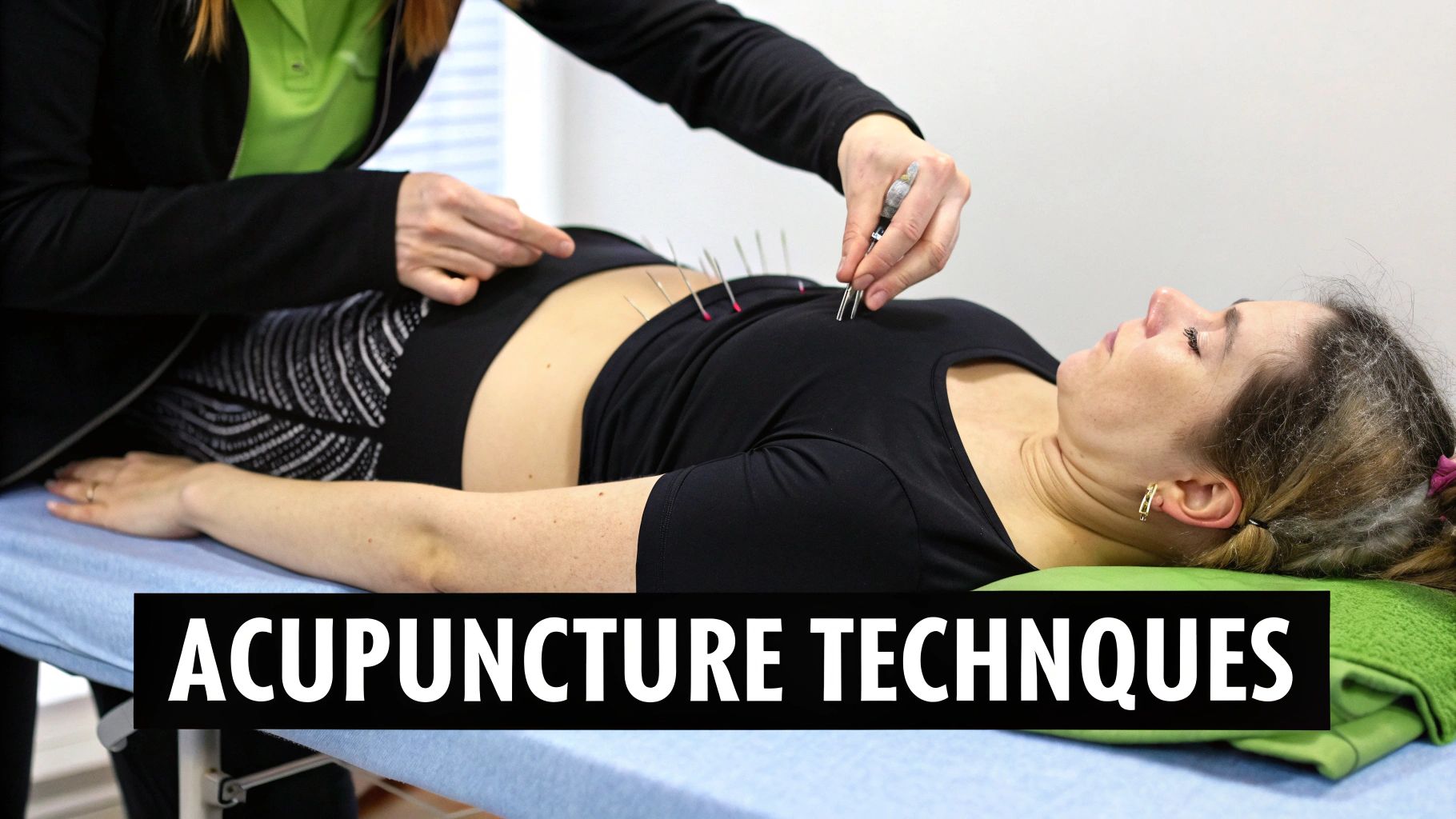
While acupuncture is a phenomenal tool for directing your body's energy, Chinese herbal medicine provides the deep, foundational nourishment needed to build a fertile internal landscape. This is a cornerstone of traditional Chinese medicine fertility protocols and goes far beyond the single-herb supplements you might find on a health food store shelf. We work with complex, synergistic formulas designed specifically to correct your body’s unique imbalances.
Let me put it this way: if acupuncture is the expert gardener directing water flow and pulling weeds, then herbal medicine is the rich, custom-blended fertilizer. Each ingredient is carefully selected to enrich the ‘soil’ (your body), balance the internal ‘climate’ (your hormones), and provide the essential building blocks for healthy growth.
Personalized Formulas for Specific Needs
A skilled TCM practitioner will never hand you a generic, one-size-fits-all fertility blend. Instead, your herbal formula is created just for you, following a detailed diagnosis that takes your entire health story into account. It's this precision that allows us to get to the root of what's holding you back.
For instance, we might design a formula to:
- Build Blood: This helps create a thick, receptive uterine lining—the perfect home for an embryo to implant.
- Nourish Kidney Yin: Essential for improving egg quality and promoting healthy follicle development.
- Strengthen Kidney Yang: This provides the metabolic "fire" or warmth needed to support implantation and sustain a new pregnancy.
- Move Stagnant Qi: We often see this with irregular cycles or cramping, and moving this stuck energy is key to restoring flow and function.
These formulas are also dynamic. We often adjust them throughout your menstrual cycle to support the very different hormonal needs of your follicular and luteal phases. This ensures your body receives exactly what it needs, right when it needs it.
The Importance of a Qualified Practitioner
I can't stress this enough: it is absolutely essential to work with a licensed and experienced practitioner. They have the deep diagnostic training needed to pinpoint your underlying pattern and prescribe a formula that is both safe and effective for you. A professional also sources high-quality, third-party tested herbs, ensuring you get a pure and potent product.
Self-prescribing herbs can be ineffective at best and unsafe at worst. A professional ensures your herbal therapy is tailored to your constitution and works in harmony with any other treatments you may be undergoing, including modern medical interventions.
This careful, personalized strategy is what makes Chinese herbal medicine such a profound part of the fertility journey. It’s not just about taking herbs; it’s about rebuilding your body’s foundational health to create the ideal conditions for new life to take root and flourish.
Building a Fertility-Friendly Diet and Lifestyle
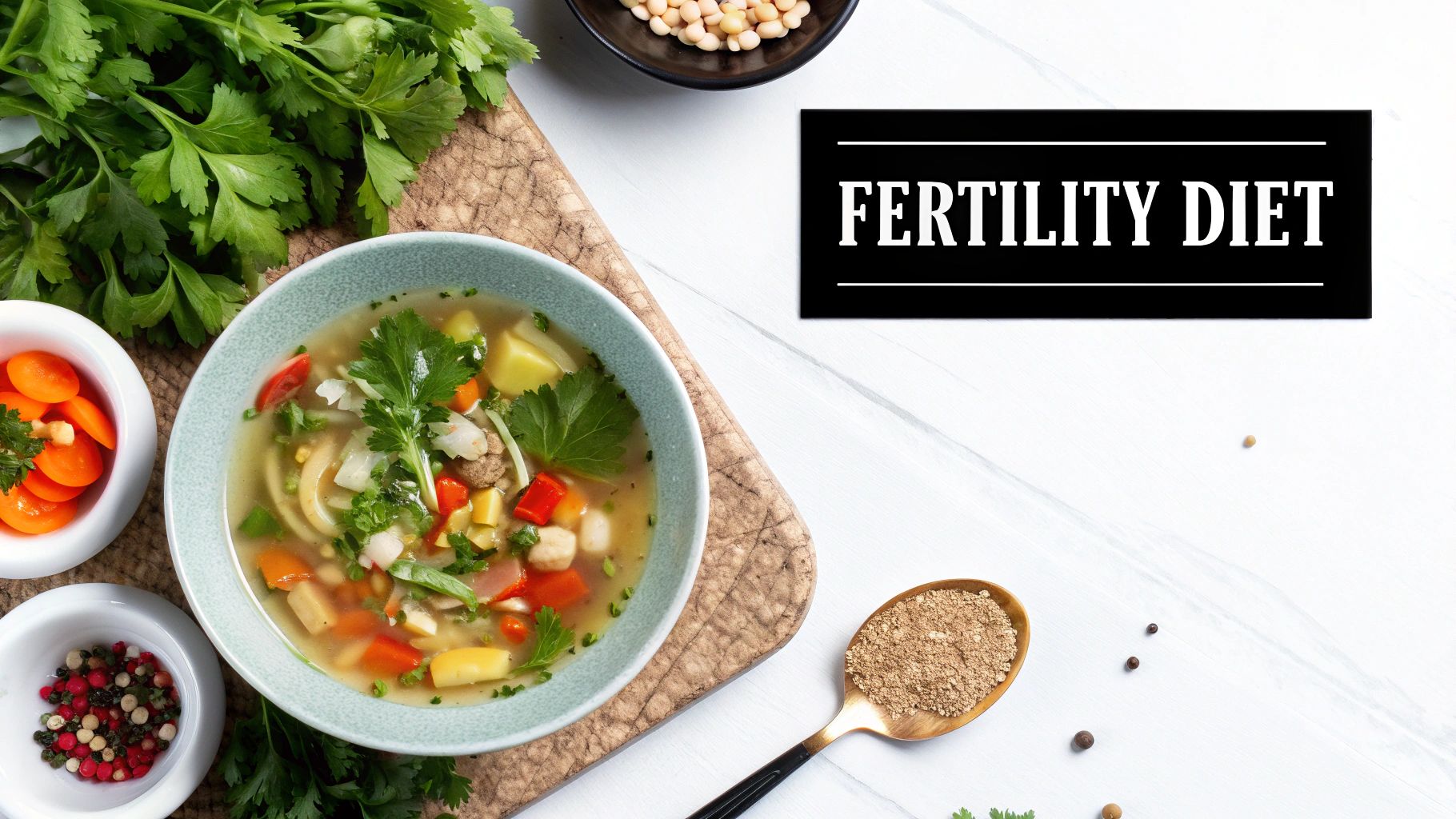
While acupuncture and herbs are powerful tools, true fertility support in TCM is a partnership. What happens in the treatment room is only half the story; the other half is woven into the choices you make every single day. The food on your plate, how you navigate stress, and the quality of your rest—these are the elements that build the deep, foundational health needed for conception. This is where you become the most active and empowered participant in your journey.
One of the most fundamental ideas in traditional chinese medicine fertility is that food is medicine. A fertility-focused diet is all about building your body’s core resources, what we call Qi and Blood, and ensuring your uterus is a warm, receptive home for a new life.
Think of it like tending a garden. If you want a seed to sprout and flourish, you wouldn't plant it in cold, damp soil. It simply wouldn't thrive. Your body works on the same principle. A diet heavy on cold, raw foods—like big salads, icy smoothies, and iced drinks—can put out your digestive "fire," creating an internal environment that is less than ideal for implantation.
Embracing Nourishing and Warming Foods
Instead, the TCM approach to diet champions cooked, nourishing, and easily digestible meals. Things like hearty soups, slow-cooked stews, roasted vegetables, and warm whole grains help build your body’s energy reserves, rather than forcing your system to expend precious energy just on digestion. This smart strategy conserves your vital resources, allowing them to be directed where they're needed most: your reproductive system.
To get started, here’s a simple breakdown of what to focus on.
TCM Dietary Guidelines for Enhancing Fertility
This table breaks down food categories according to TCM principles to help you make fertility-supportive choices.
| Food Category | Foods to Emphasize (Nourishing & Warming) | Foods to Moderate (Potentially Dampening or Cooling) |
|---|---|---|
| Vegetables | Cooked leafy greens (kale, chard), squash, sweet potatoes, carrots, beets, mushrooms, steamed broccoli, roasted asparagus | Raw salads, cucumbers, celery, tomatoes, sprouts |
| Proteins | Organic chicken & beef, bone broth, lamb, eggs, black beans, adzuki beans, wild-caught salmon | Tofu, soy products, dairy (milk, yogurt), processed meats |
| Grains | Quinoa, millet, congee (rice porridge), brown rice, oats (cooked) | Wheat, refined flours, cold cereals, pasta |
| Fruits | Goji berries, dates, cherries, cooked apples/pears | Bananas, watermelon, citrus fruits, tropical fruits |
| Fats & Nuts | Avocado, walnuts, black sesame seeds, pumpkin seeds, ghee | Peanuts, excessive oils, fried foods |
| Beverages | Warm water, ginger tea, raspberry leaf tea, bone broth | Ice water, coffee, alcohol, sugary sodas, cold juices |
Focusing on these warming foods helps create a diet that feels comforting, grounding, and truly strengthening.
By choosing warm, cooked foods, you are essentially pre-digesting your meals. This makes it far easier for your body to pull out the nutrients it needs to build the rich foundation for a healthy pregnancy.
Managing Stress and Prioritizing Rest
What you do is just as important as what you eat. Chronic stress is one of the biggest roadblocks to fertility because it pulls your body’s energy away from reproductive functions and shunts it into a "fight or flight" survival mode. For this reason, integrating practices to manage stress isn't just a good idea—it's non-negotiable.
Simple activities like meditation, gentle yoga, or even just carving out quiet time in nature can make a huge difference in lowering cortisol and restoring your body's equilibrium.
Sleep is another cornerstone. Deep, restorative sleep is when your body does its most important repair work and regulates hormones. Aim for 7-9 hours of quality sleep per night in a dark, cool room to sync up with your body's natural healing rhythms.
Finally, movement is key, but the type of movement matters. Gentle, consistent exercise like walking, swimming, or Tai Chi is fantastic for keeping your Qi and Blood flowing smoothly. Overly intense, strenuous exercise, on the other hand, can actually deplete your resources. It’s all about finding that sweet spot.
By actively nurturing your body through diet, rest, and mindful living, you create a resilient, fertile, and welcoming internal landscape.
Integrating TCM with Modern Fertility Treatments
The fertility journey can often feel like you’re standing at a crossroads, forced to choose between a natural, Eastern path and a modern, Western one. But what if you didn’t have to choose? In my experience, the most powerful approach doesn’t force a choice but instead blends the strengths of both, creating a beautiful synergy between ancient wisdom and modern technology.
Using traditional Chinese medicine for fertility isn’t about turning your back on treatments like IUI or IVF. Far from it. It's about preparing your body to get the absolute most out of those incredible medical advancements.
I often use this analogy with my patients: if IVF is the careful planting of a precious seed, TCM is the art of cultivating rich, fertile soil. We’re working to give that seed the best possible chance to take root and flourish. This approach helps create an optimal internal environment, making your body more receptive to assisted reproductive technologies (ART).
Enhancing IVF and IUI Outcomes
This is where acupuncture really shines. When timed strategically around modern fertility procedures, especially before and after an embryo transfer, its benefits can be profound. By stimulating specific points, acupuncture has been shown to increase blood flow directly to the uterus. Better circulation means more oxygen and nutrients are delivered right where they’re needed, helping to build a thicker, healthier uterine lining—a key factor for successful implantation.
We also can't ignore the emotional side of this process. The stress of fertility treatments is immense, and high cortisol levels can wreak havoc on your reproductive hormones. Acupuncture is deeply calming. It triggers a release of endorphins, nature’s own stress-relievers, helping to soothe your nervous system when you need it most.
By combining the diagnostic precision of Western medicine with the holistic, preparatory power of TCM, you create a comprehensive support system. This integrated strategy addresses your body on every level—physical, hormonal, and emotional—to improve your chances of a successful pregnancy.
This isn’t just a nice idea; we see it in the research. A retrospective study of women undergoing their second IVF cycle found that adding TCM led to a clinical pregnancy rate of 51.11% and a live birth rate of 42.22%. You can read more about these findings on integrating TCM with IVF.
Building a Stronger Foundation with Herbs
Chinese herbal medicine is the other half of this preparatory equation. Long before an IUI or IVF cycle begins, I work with patients on a personalized herbal formula designed to get their body ready. This can help:
- Improve Egg Quality: By nourishing the body's essential substances (what we call Yin and Blood), herbs support the development of healthier, more robust eggs.
- Thicken the Uterine Lining: Certain herbs are masters at building Blood, which directly contributes to creating a lush, welcoming endometrial lining.
- Support Post-Treatment Recovery: After undergoing demanding medical procedures, specific formulas can help your body recover its strength and balance more quickly.
By thoughtfully integrating these practices, we ensure your body is as strong, balanced, and ready as possible, maximizing the potential of every medical intervention you pursue.
What to Expect from Your First TCM Consultation
Taking that first step into Traditional Chinese Medicine fertility support can be a mix of excitement and maybe a little uncertainty. I get it. Your initial consultation is where we get to know you—not just your symptoms, but your entire health story. Our goal is to look past the surface and find the root patterns that might be impacting your ability to conceive.
This first meeting is really a conversation. We'll talk about everything from your menstrual cycle and health history to your digestion, sleep quality, and even how you're feeling emotionally. This comprehensive approach gives me a complete picture of your body's internal landscape.
The Diagnostic Process
After we talk, I'll use two of the most important diagnostic tools in TCM, both of which are gentle and non-invasive.
- Pulse Diagnosis: By simply feeling the pulse at different positions on both of your wrists, I can get a surprisingly detailed read on the flow of Qi and Blood through your various organ systems.
- Tongue Diagnosis: The color, shape, and coating of your tongue act like a visual map of your internal health, instantly revealing areas of imbalance.
These ancient techniques provide incredible insight, allowing me to connect all the dots between your overall health and your fertility.
Your first visit is all about discovery. We work together to understand how your body’s systems are communicating and pinpoint exactly where we need to focus our efforts to create a more fertile, balanced state.
The trust in TCM for fertility isn't just anecdotal; it's a global phenomenon. To give you some perspective, China's fertility services market, which heavily incorporates TCM, was valued at $2.58 billion and continues to see significant growth. You can discover more about the expanding fertility services market on marketresearchfuture.com.
Based on this detailed assessment, I’ll develop a customized treatment plan just for you. This will outline how often we should meet for acupuncture—usually once a week to start—and might include a personalized herbal formula. You'll leave with a clear understanding of the proposed timeline and costs.
For a closer look at the treatment itself, you can read our guide on what to expect during an acupuncture appointment.
Common Questions About TCM and Fertility
It's completely natural to have questions when you're thinking about using traditional chinese medicine fertility support. I get it. This is a big step, and you want to feel sure about your choices. Let's walk through some of the most common questions I hear in my clinic to give you a clearer picture.
How Long Does It Take to See Results?
This is probably the number one question I'm asked, and the honest answer is: it depends on you. Everyone’s body is different, so there's no magic one-size-fits-all timeline.
That said, I generally advise my patients to commit to at least three to six months of consistent treatment. This isn't a random number. It's based on the body's natural cycle of developing an ovarian follicle, which takes about 90-120 days. Giving ourselves this window allows the acupuncture and herbs to really do their work.
Over these few months, we're aiming to:
- Regulate your menstrual cycle and balance your hormones.
- Boost healthy blood flow to your uterus and ovaries.
- Improve the quality of your eggs as they mature.
- Strengthen your body's overall health to create a welcoming environment for pregnancy.
Think of it as preparing the soil before planting a seed. It takes time, but a strong, fertile foundation is worth the patience.
Is Fertility Acupuncture Painful?
Most people are pleasantly surprised by how gentle acupuncture is. The needles we use are incredibly fine—about the width of a human hair. You might feel a tiny, fleeting pinch when a needle is first inserted, but that sensation disappears almost instantly.
What you'll likely experience instead is a mild, dull, or warm tingling at the needle site. We call this feeling deqi, and it's a good thing! It’s a sign that your body’s vital energy, or Qi, is responding to the treatment. Many of my patients find their sessions so relaxing they doze off on the table. Considering how much stress can interfere with fertility, this deep relaxation is a powerful therapy in itself. We talk more about this in our post on using traditional chinese medicine for anxiety.
Should My Partner Also Get Treatment?
Yes, absolutely. Conception is a two-person equation. With male-factor issues playing a role in a significant number of infertility cases, looking at both partners gives you the best possible odds. TCM is just as effective for improving male fertility, helping to boost sperm count, motility (how they swim), and morphology (their shape).
A man’s treatment plan usually involves a combination of acupuncture, a custom herbal formula, and specific lifestyle adjustments. This integrated approach works to lower stress, improve circulation, and boost overall vitality—all key factors for producing healthy sperm and increasing your chances as a couple.
Are Chinese Herbs for Fertility Safe?
When they are prescribed by a qualified, licensed TCM practitioner, yes, Chinese herbal formulas are very safe. A trained herbalist doesn't just hand you a bottle off the shelf; they perform a detailed diagnosis to create a formula specifically for your body and your unique health pattern.
We only source high-quality herbs that have been tested for purity and potency. This is why it’s so important to work with a professional and not self-prescribe. Always let your practitioner know about any other medications or supplements you’re taking to ensure everything works together safely.
At Eric Tsai Acupuncture and Herbs, we blend the time-tested wisdom of traditional medicine with a modern understanding of fertility. If you feel ready to see how a personalized treatment plan could support you on your path to parenthood, I invite you to book a consultation at https://drerictsai.com.

